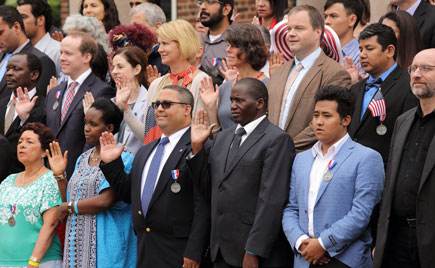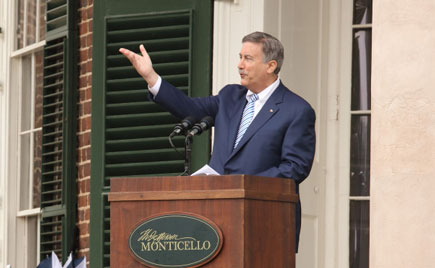First Year powers WNYC’s “The Takeaway”



July 4th, the birthday the United States of America, also serves as a powerful reminder of the role immigration has played in our nation’s history. Every year on Independence Day, Monticello, Thomas Jefferson’s home, hosts a powerful naturalization ceremony where people from all over the world become American citizens.
As part of this year’s ceremony, the First Year Project partnered with Monticello and New York’s WNYC to take a close look at how immigration is affecting—and will be affected by—this year’s election. The program, “The Takeaway” with host John Hockenberry, features highlights from the ceremony, interviews with new citizens, and excerpts from a panel featuring First Year Project authors Daniel Tichenor and David Martin.
In an episode entitled “America and Immigration: An Uneasy Union,” the show suggests that America is at a crossroads. Is our message to immigrants “welcome” or “stay away?” It is 49 minutes long and available on-demand here.
During the program we hear from new citizens like Nawal Alshamaa, an engineer who fled violence in Iraq and now works at Wal-Mart. “I know some people don’t like us,” she says, “but we just want to be human beings.”
Andrea Bonilla who came here illegally as a child from Ecuador, reflects on how President Obama’s Deferred Action for Childhood Arrivals (DACA) policies have affected her life—and what a change might mean.
Larry Sabato of UVA’s Center for Politics, the ceremony’s featured speaker, urges the new citizens to use their life experiences to “help us live up to American ideals. Make us better. . . ."
And from the panel, Tichenor and Martin agree that, depending on the results, this election could provide a window of opportunity for our next president to address the flaws in our immigration system.
Tichenor says that any significant reform “requires strange bedfellow coalitions” but that “Chamber of Commerce Republicans” might be open to working with Democrats on the issue. He says that through history Americans have supported in the idea of immigration while being uneasy with the process.
Martin believes the first year is the most opportune time for a president to break through the distrust surrounding immigration. A package of reforms in 1986 combining legalization with enforcement has served as a cautionary tale because the enforcement components failed. But, he says, the mechanisms developed after 9/11 make enforcement much more feasible. And he notes that more Americans favor some kind of path to legalization than was the case in the mid-1980s.
For more on the issue, see First Year Project Volume 4: Controlling the borders.